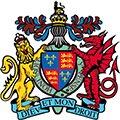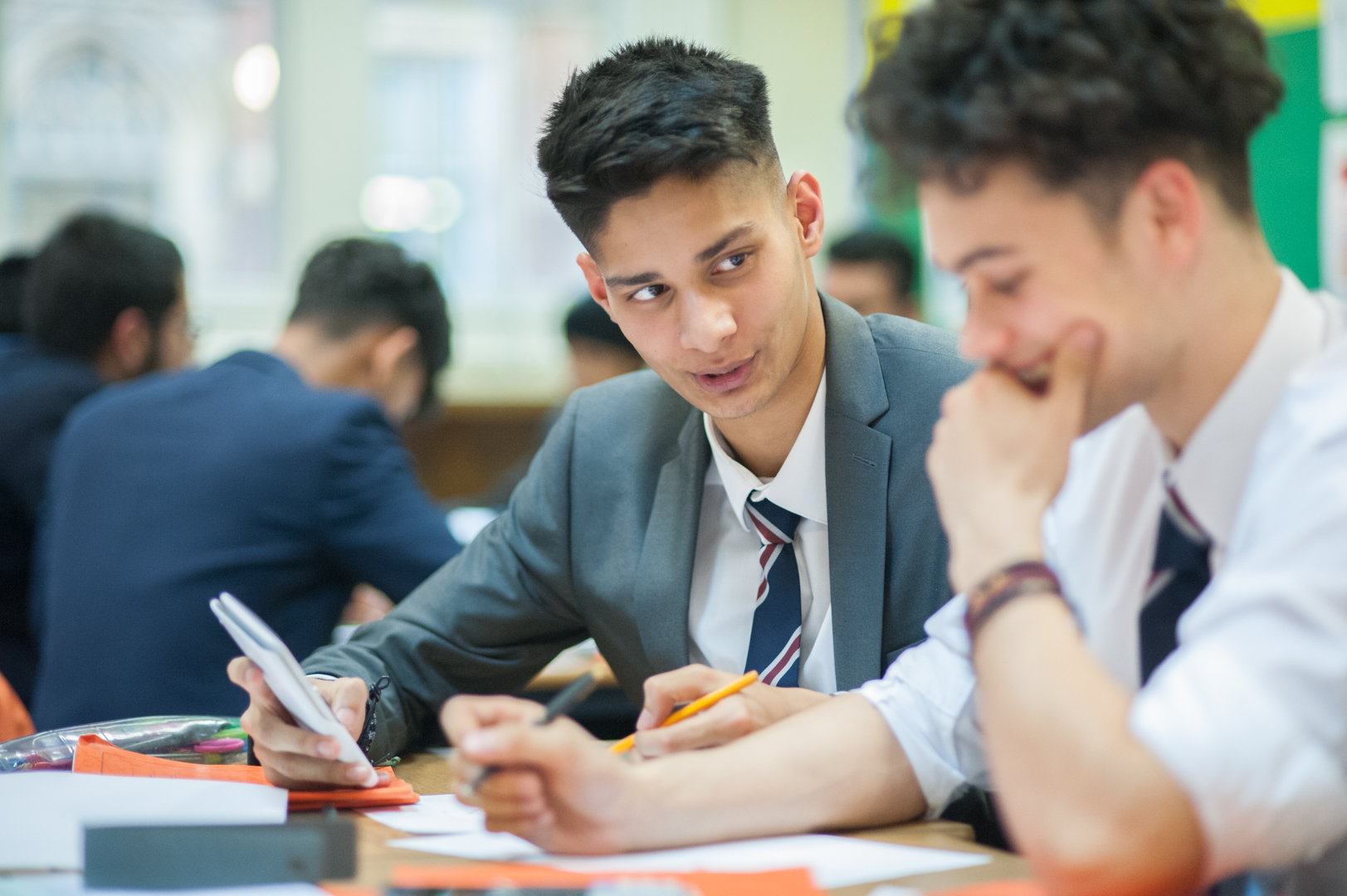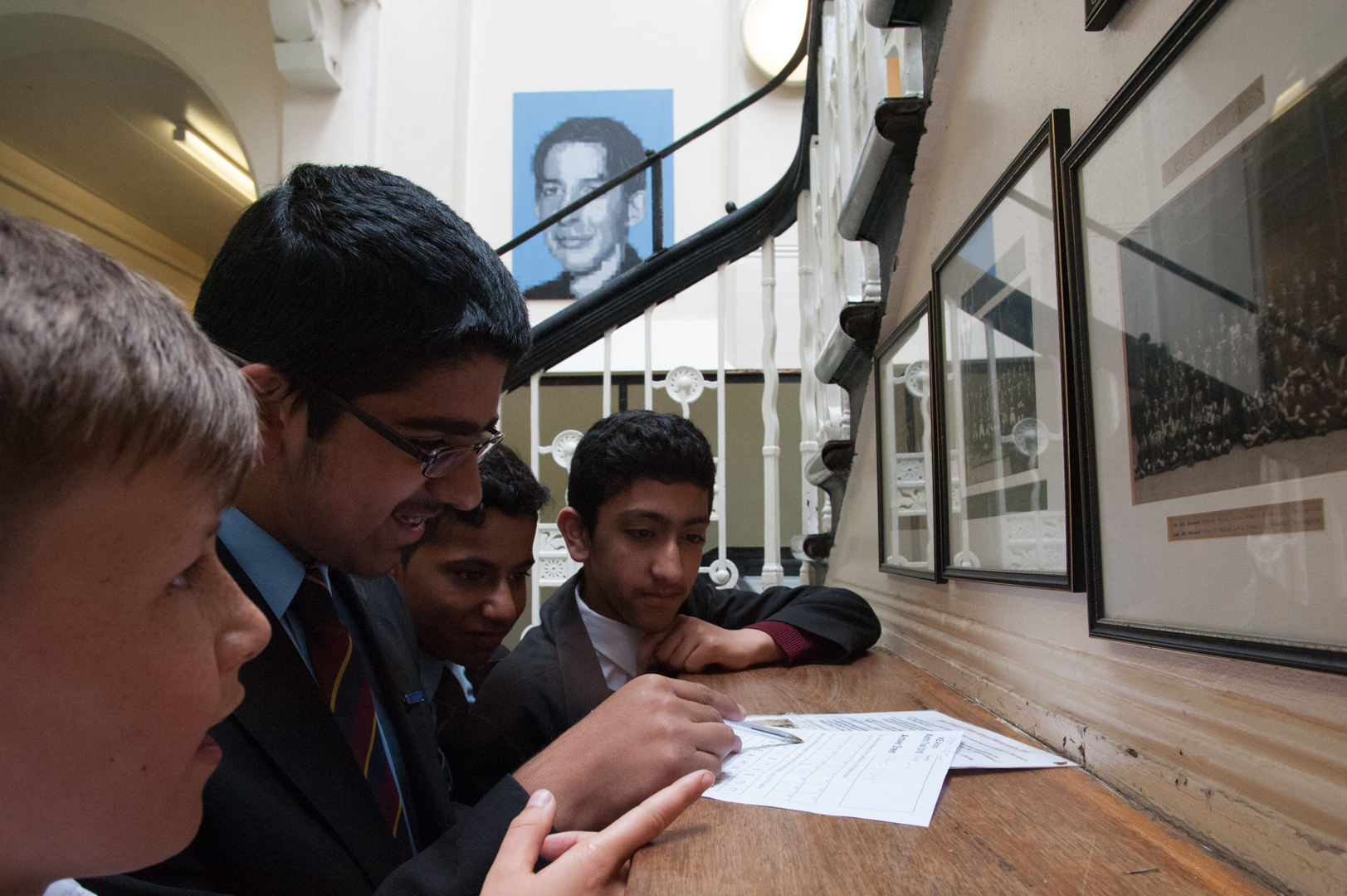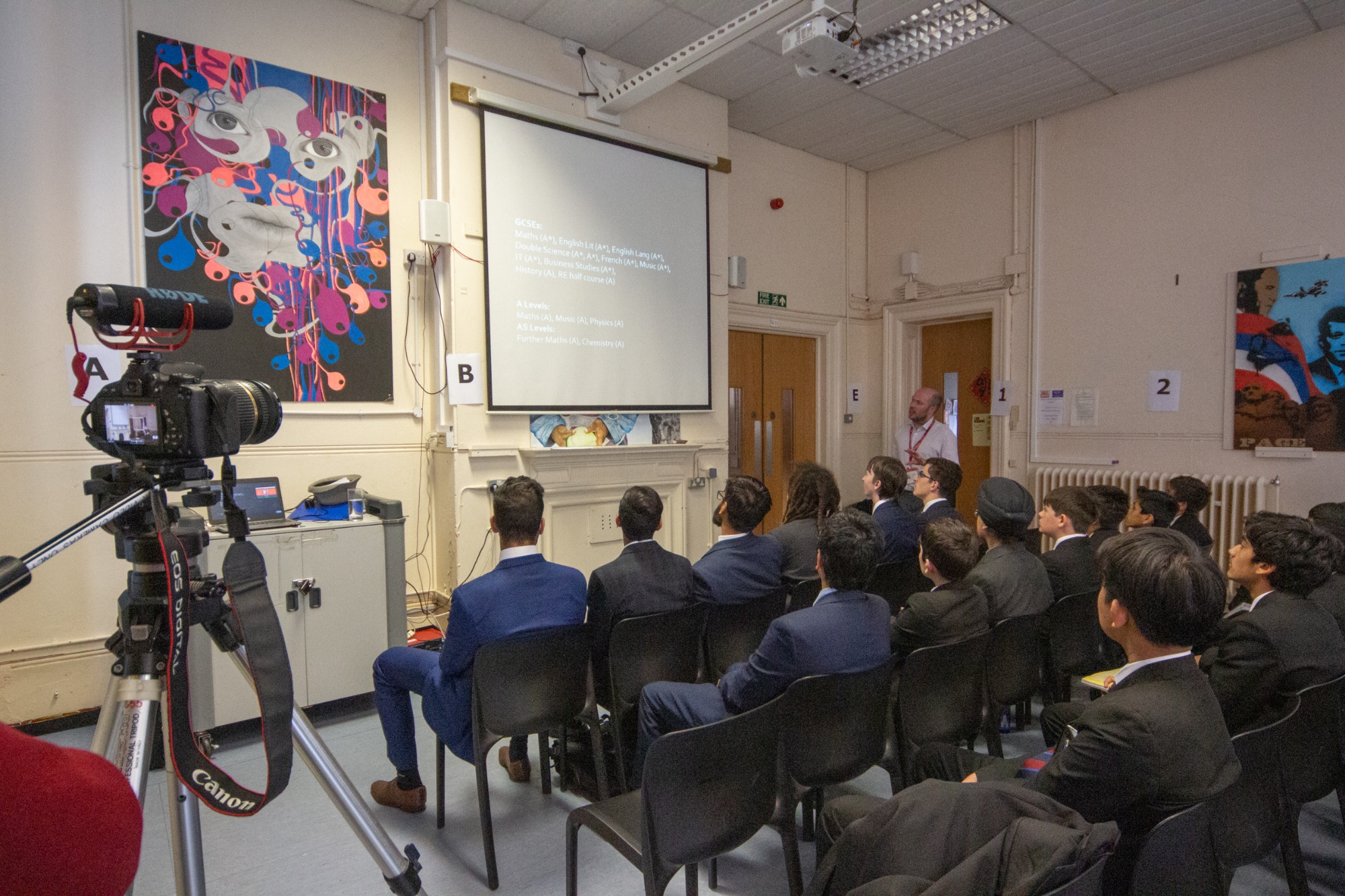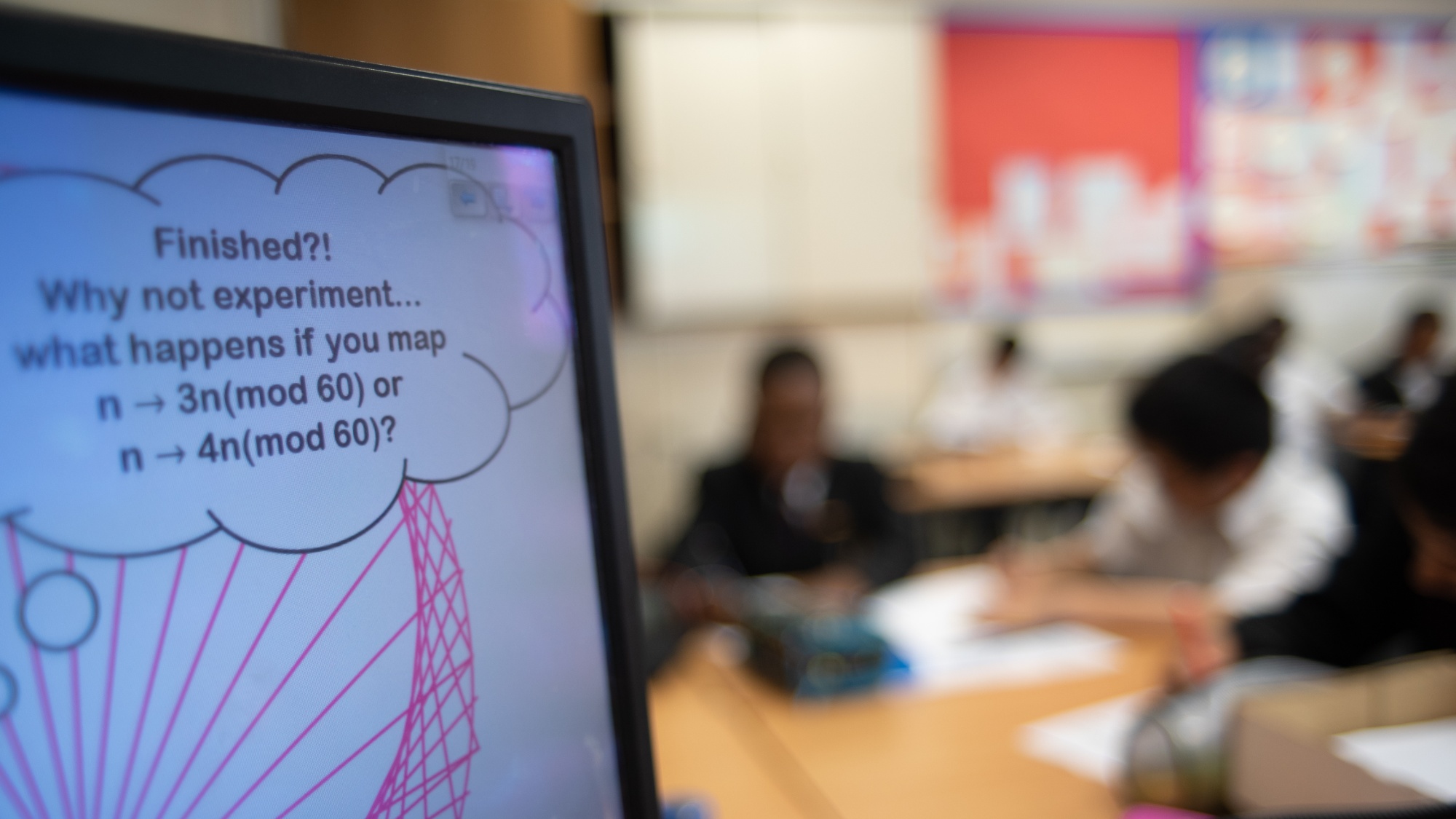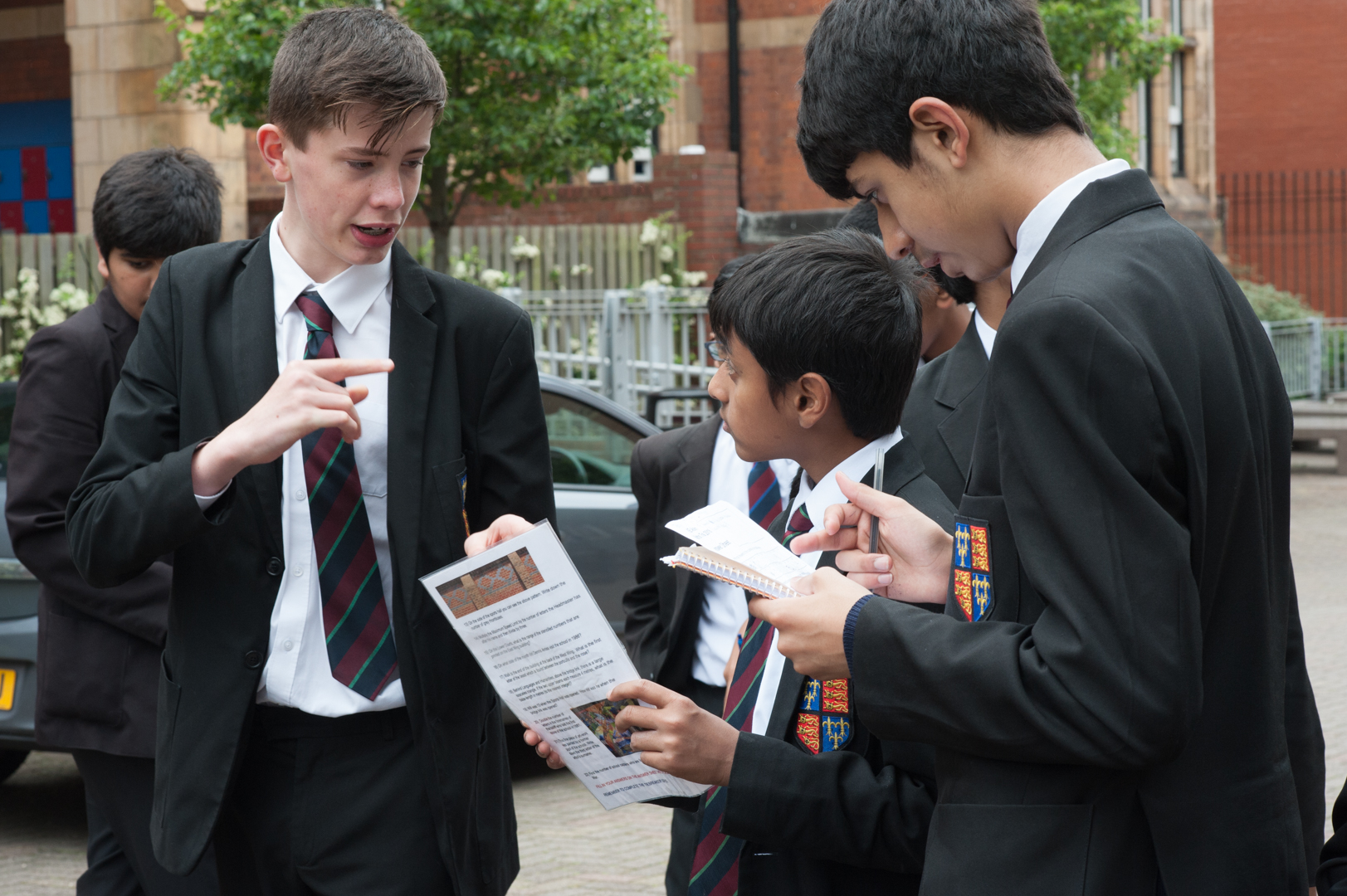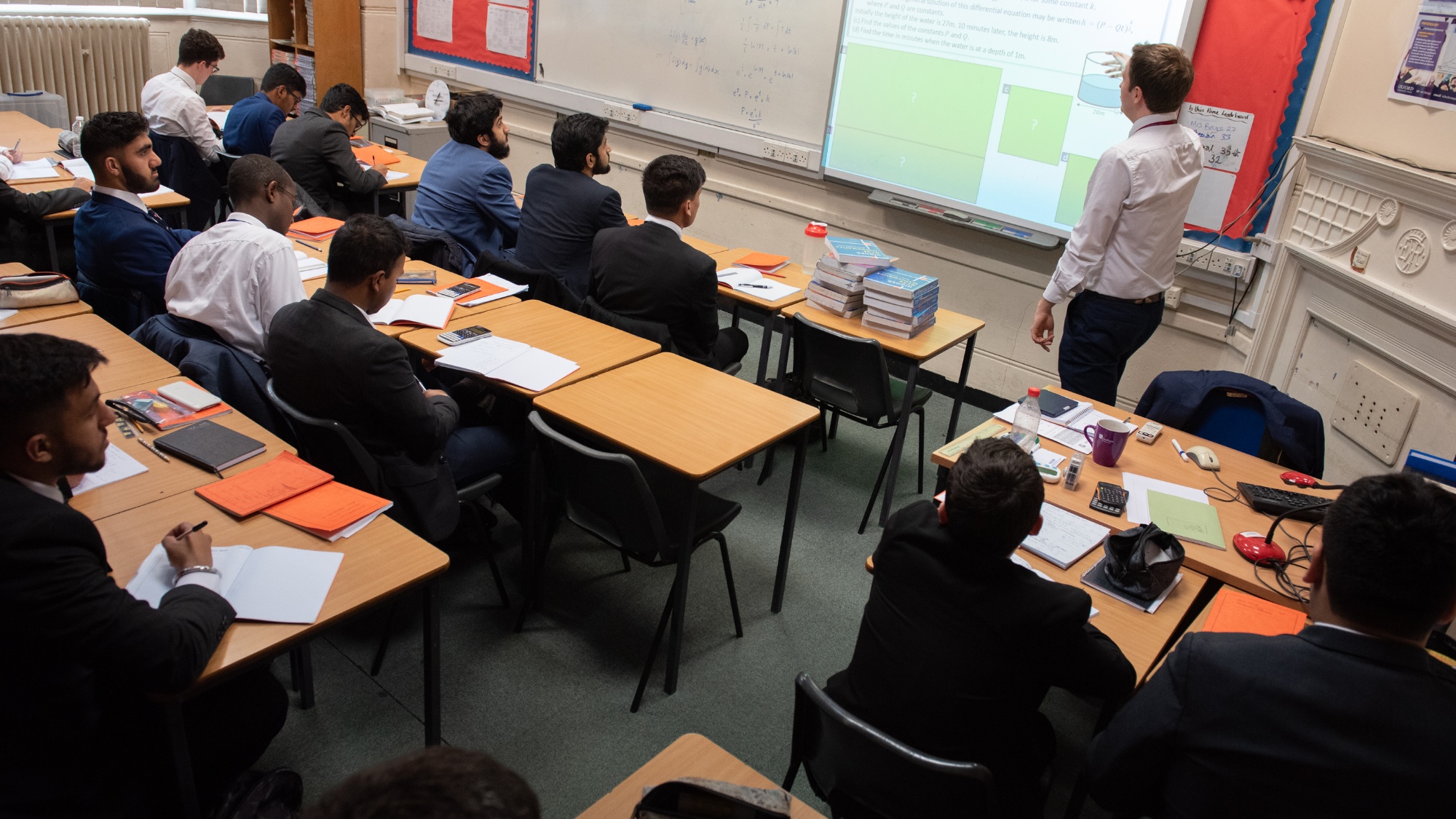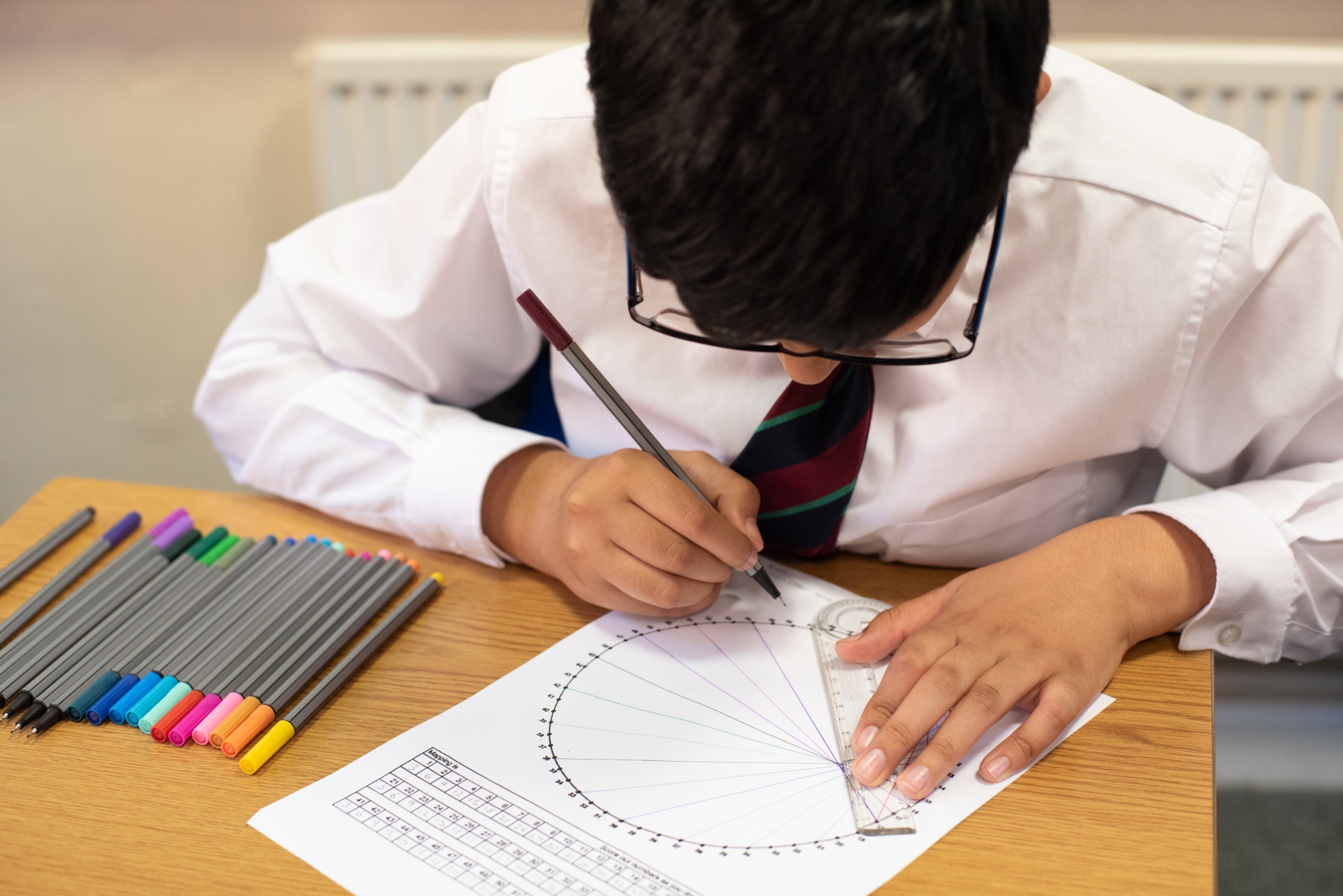The Mathematics Department aims to help your child discover the joy and beauty of this fascinating and extremely rewarding subject. Our primary objective is to ensure all students develop a strong foundation in mathematical fluency and language, fostering confidence in problem-solving. Through our creative curriculum, which carefully weaves prior learning throughout the academic journey, we cultivate a love of learning and enhance students' ability to model and solve complex, non-routine problems using their mathematical knowledge.
Our curriculum extends beyond the standard specification, offering enriching experiences and activities accessible to all students, regardless of background. We nurture independence, critical thinking and enthusiasm through engaging lessons and diverse extra-curricular opportunities. These include Mathematics Inspiration lectures, inter-school Mathematics competitions and participation in the prestigious UKMT Mathematics Challenge.
Teaching Staff:
Mr J Berwick (Head of Mathematics)
Mrs N Ahmad
Miss N Khatun
Mr A Lee
Mr Z Perwez
Mr M Plackowski (Assistant Headteacher)
Mr Y Said (Second in Mathematics)
Ms C Whitehead
Trips and Visits:
- UKMT team competitions held locally
- Visits to local universities for Mathematics inspiration days
- In-school visits by external speakers
Year 7
| Summary of curriculum: |
In Year 7, we equip students with the mathematical methods and techniques they need to write clear solutions across all topics. Throughout the year, we study five modules covering every strand of mathematics—number, algebra, shape, ratio, and statistics and probability—so students build confidence and competence. Our curriculum is carefully designed to interweave previously learnt topics. For example, students get introduced to algebraic problems when looking at areas and perimeters of shapes.
Students complete work from a variety of resources that can involve challenging problems. The textbooks that we sometimes use inside of class are the 7A and 8A STP textbooks.
|
| Overview of Y7: |
Module 1 (Half term 1):
- Multiply and divide by 10, 100, 1000.
- Mental & written calculations.
- Fraction calculations.
- Fraction, Decimals and Percentage equivalence
- Factors and multiples
Module 2 (Half term 2):
- Using letter symbols
- Simplifying terms
- Expanding single brackets
- Using formulae
- Solving equations
- Coordinates and straight-line graphs
Module 3 (Half term 3):
- Converting metric & imperial measures
- Perimeter & area of triangles and quadrilaterals
- Surface area & volume of cuboids
- Simple angle formulae
- Transformations (not enlargement)
Module 4 (Half term 4):
- Linear sequences
- Simplifying & finding values in ratios
- Proportions as fractions, decimals or percentages
- Percentages of amounts
- Percentage increase/decrease
Module 5 (Half term 5 and 6):
- Averages and range
- Drawing frequency tables, bar charts and pie charts
- Averages from tables
- Probability scale and equally likely outcomes
- Mutually exclusive events
- Experimental probability
- Sorting with Venn diagrams
- Constructing triangles
|
| Assessment throughout the year: |
- Y7 students sit a baseline assessment at the start of the first half-term. This is to ensure all lessons are pitched correctly and teachers know which topics to go over in more detail.
- Students sit an assessment on each of the first four modules in the following half-terms.
- Students sit a 1 x hour non-calculator paper and a 1 x hour calculator paper in the final half-term on everything that they have learnt throughout the year.
- Regular ‘checkpoints’ are used at the end of subtopics to ensure students have fully understood the material.
- Homework is set on Dr Frost Maths which is a software that helps teachers monitor progress and helps students to understand their mistakes.
|
| How parents can support their son’s learning: |
Encourage him to complete daily ‘five a day’ on the corbettmaths site (see below) using the difficulty level ‘numeracy'.
Encourage him to regularly practise using his drfrostmaths account by clicking the following on his dashboard:
- Topic explorer (then watch teaching videos/download teaching slides/practise questions/take topic tests)
- Practise: times tables; practise by topic, Y7 scheme of work; and past papers:
- Edexcel/OCR/AQA foundation papers
- SATS KS3 level 3 to 5 or 4 to 6
Encourage him to ensure that all homework on Dr Frost Maths is written up in their book neatly with a clear title, the questions, methods and answers. Most importantly, the work should be marked as they are going along.
If he requires more support or extension in his mathematics, encourage him to attend mathematics drop-in on Tuesday lunchtimes in W3 and to speak to Mr Berwick about being paired with a Year 12 ‘Mathematics Mentor’.
|
| Able and inspired opportunities: |
- UKMT Junior Mathematics Challenge and Kangaroo or Olympiad: the individual competition takes place in April.
- Parallel weekly problems.
- Explore the available courses on the Mathigon website.
- Explore the numberphile YouTube channel.
- Attend codebreaking club on Friday lunchtimes.
|
| Useful websites: |
|
Year 8
| Summary of curriculum: |
In year 8 we build upon the Mathematical methods and techniques learnt in year 7. We study topics from all strands of Mathematics (number, algebra, data, shape) allowing all students to continue to grow in confidence and competence.
Students complete work from a variety of resources that can involve challenging problems. The textbooks that we sometimes use inside of class are the 8A and 9A STP textbooks.
|
| Main topics: |
- Transformations
- Fractions
- Polygons
- Linear equations
- Area
- Circles
- Probability
- Organising data
- Indices/standard form
- Fractions and percentages
- Inequalities
- Solids
- Ratio and proportion
- Scale drawing
- Pythagoras' theorem
- Linear graphs
|
| Assessment throughout the year: |
- Students sit an assessment once per half-term on the content that they have learnt in that half term, as well as some previous learning from other years.
- Students sit a 1 x hour non-calculator paper and a 1 x hour calculator paper in the final term on everything that they have learnt throughout the year.
- Regular ‘topic tests’ are used at the end of subtopics to ensure students have fully understood the material.
- Homework is set on Dr Frost Maths which is a software that helps teachers monitor progress and helps students to understand their mistakes.
|
| How parents can support their son’s learning: |
Encourage him to regularly practise using his drfrostmaths account by clicking the following on his dashboard:
- Topic explorer (then watch teaching videos/download teaching slides/practise questions/take topic tests)
- Practise: times tables; practise by topic, Y8 scheme of work; and past papers:
- Edexcel/OCR/AQA foundation papers
- SATS KS3 level 3 to 5 or 4 to 6
Encourage him to ensure that all homework on Dr Frost Maths is written up in their book neatly with a clear title, the questions, methods and answers. Most importantly, the work should be marked as they are going along.
If he requires more support or extension in his mathematics, encourage him to attend mathematics drop-in on Tuesday lunchtimes in W3 and to speak to Mr Berwick about being paired with a Year 12 ‘Mathematics Mentor’.
|
| Able and inspired opportunities: |
- UKMT Junior Mathematics Challenge and Kangaroo or Olympiad: the individual competition takes place in April.
- Parallel weekly problems.
- Explore the available courses on the Mathigon website.
- Explore the numberphile youtube channel.
- Attend codebreaking club on Friday lunchtimes.
|
| Useful websites: |
|
Year 9
| Summary of curriculum: |
In year 9 we build upon the Mathematical methods and techniques learnt in years 7 and 8. We study topics from all strands of Mathematics (number, algebra, data, shape) allowing all students to continue to grow in confidence and competence.
Students complete work from a variety of resources that can involve challenging problems. The textbooks that we sometimes use inside of class are the 9A STP textbook and Higher Rayner GCSE textbook.
|
| Main topics: |
- Algebraic products
- Percentages
- Proportion using ratio
- Sampling
- Pythagoras
- Probability
- Straight line graphs
- Number
- Inequalities
- Trigonometry
- Algebraic factors
- Solids
- Organising fata
- Simultaneous equations
- Mean
- Transformations
- Quadratics
- Graph drawing
|
| Assessment throughout the year: |
- Students sit an assessment once per half-term on the content that they have learnt in that half term, as well as some previous learning from other years.
- Students sit a 1 x hour non-calculator paper and a 1 x hour calculator paper in the final term on everything that they have learnt throughout the year.
- Regular ‘topic tests’ are used at the end of subtopics to ensure students have fully understood the material.
- Homework is set on Dr Frost Maths which is a software that helps teachers monitor progress and helps students to understand their mistakes.
|
| How parents can support their son’s learning: |
Encourage him to regularly practise using his drfrostmaths account by clicking the following on his dashboard:
- Topic explorer (then watch teaching videos/download teaching slides/practise questions/take topic tests)
- Practise: times tables; practise by topic, Y9 scheme of work; and past papers:
- Edexcel/OCR/AQA foundation papers
- SATS KS3 level 3 to 5 or 4 to 6
Encourage him to ensure that all homework on Dr Frost Maths is written up in their book neatly with a clear title, the questions, methods and answers. Most importantly, the work should be marked as they are going along.
If he requires more support or extension in his mathematics, encourage him to attend mathematics drop-in on Tuesday lunchtimes in W3 and to speak to Mr Berwick about being paired with a Year 12 ‘Mathematics Mentor’.
|
| Able and inspired opportunities: |
- UKMT Intermediate Mathematics Challenge and Kangaroo or Olympiad: the individual competition takes place in January.
- Parallel weekly problems.
- Explore the available courses on the Mathigon website.
- Explore the numberphile YouTube channel.
- Attend codebreaking club on Friday lunchtimes.
|
| Useful websites: |
|
Year 10
| Summary of curriculum: |
In year 10 we build upon the mathematical methods and techniques learnt in years 7 to 9. We study topics from all strands of Mathematics (number, algebra, data, shape) allowing all students to continue to grow in confidence and competence.
Students complete work from a variety of resources that can involve challenging problems. The textbooks that we sometimes use inside of class are the 10A STP textbook and Higher Rayner GCSE textbook.
|
| Main topics: |
- Trigonometry
- Quadratics
- Mensuration
- Indices and surds
- Circle theorems
- Algebraic fractions
- Formulas
- Bounds
- Probability
- Similar figures
- Congruence and similarity
- Inequalities
|
| Assessment throughout the year: |
- Students sit an assessment once per half-term on the content that they have learnt in that half term, as well as some previous learning from other years.
- Students sit a 1 x hour non-calculator paper and a 1 x hour calculator paper in the final term on everything that they have learnt throughout the year.
- Homework is set on Dr Frost Maths which is a software that helps teachers monitor progress and helps students to understand their mistakes.
|
| How parents can support their son’s learning: |
Encourage him to regularly practise using his drfrostmaths account by clicking the following on his dashboard:
- Topic explorer (then watch teaching videos/download teaching slides/practise questions/take topic tests)
- Practise: practise by topic, Y10 scheme of work; and past papers:
- Edexcel/OCR/AQA foundation and higher papers
- SATS KS3 level 4 to 6
Encourage him to ensure that all homework on Dr Frost Maths is written up in their book neatly with a clear title, the questions, methods and answers. Most importantly, the work should be marked as they are going along.
If he requires more support or extension in his mathematics, encourage him to attend mathematics drop-in on Tuesday lunchtimes in W3 and to speak to Mr Berwick about being paired with a Year 12 ‘Mathematics Mentor’.
|
| Able and inspired opportunities: |
- UKMT Intermediate Mathematics Challenge and Kangaroo or Olympiad, the individual competition takes place in January.
- Parallel weekly problems.
- Explore the available courses on the Mathigon website.
- Explore the numberphile YouTube channel.
- Attend codebreaking club on Friday lunchtimes.
|
| Useful websites: |
|
Year 11
| Summary of curriculum: |
In year 11 we build upon the mathematical methods and techniques learnt in years 7 to 10. We study topics from all strands of Mathematics (number, algebra, data, shape) allowing all students to continue to grow in confidence and competence.
Students complete work from a variety of resources that can involve challenging problems. The textbook that we sometimes use inside of class is the Higher Rayner GCSE textbook.
|
| Main topics: |
- Proportion
- Linear graphs
- Curved graphs
- Real life graphs
- Functions
- Transforming graphs
- Graphical Solutions
- The discriminant
- Roots of polynomials
- Simultaneous and quadratic equations
- Sequences
- Vectors
- Histograms
- Proof
- Numerical methods
- Loci
- Permutations and combinations
- 3D trigonometry and Pythagoras
|
| Assessment throughout the year: |
- Students sit an assessment once per half-term on the content that they have learnt in that half term, as well as some previous learning from other years.
- Students sit a 1 x hour non-calculator paper and a 1 x hour calculator paper in the second half term (Mock exams) on everything that they have learnt throughout their GCSE up to that point.
- Homework is set on Dr Frost Maths which is a software that helps teachers monitor progress and helps students to understand their mistakes.
|
| How parents can support their son’s learning: |
Encourage him to regularly practise using his drfrostmaths account by clicking the following on his dashboard:
- Topic explorer (then watch teaching videos/download teaching slides/practise questions/take topic tests)
- Practise: practise by topic, Y10 & Y11 scheme of work; and past papers:
- Edexcel/OCR/AQA foundation and higher papers
- SATS KS3 level 4 to 6
Encourage him to ensure that all homework on Dr Frost Maths is written up in their book neatly with a clear title, the questions, methods and answers. Most importantly, the work should be marked as they are going along.
If he requires more support or extension in his mathematics, encourage him to attend mathematics drop-in on Tuesday lunchtimes in W3 and to speak to Mr Berwick about being paired with a Year 12 ‘Mathematics Mentor’.
|
| Able and inspired opportunities: |
- UKMT Intermediate Mathematics Challenge and Kangaroo or Olympiad: the individual competition takes place in January.
- Explore the available courses on the Mathigon website.
- Explore the numberphile YouTube channel.
- Attend codebreaking club on Friday lunchtimes.
|
| Useful websites: |
|
Year 12
| Summary of curriculum: |
In year 12, we build on the GCSE course, notably on topics from algebra and shape. New topics are introduced such as calculus and its uses. Strands of mathematics taught are categorised into pure and applied (applied consists of statistics and mechanics). The curriculum promotes analytical and evaluative skills which are essential to modelling mathematical problems.
Students complete work from a variety of resources that can involve challenging A-level problems. The textbooks that we sometimes use inside of class are the Pearson Year 1 and 2 textbooks.
|
| Overview of Y12: |
Term 1:
- Surds and Indices
- Quadratic functions and modelling
- Linear graphs
- Solving equations and inequalities
- Inequalities on graphs
- Modelling in Mechanics
- Constant acceleration of particles
- Statistical sampling
- The large data set
- Measures of location and spread
- Curved graphs and transformations
- Polynomial division and the factor theorem
- Circles
- Proof
- Binomial expansion with natural numbers
- Vectors
- Probability with Venn diagrams and tree diagrams
Term 2:
- Forces and Newton’s laws of motion
- Trigonometric ratios and their graphs
- Differentiation
- Radians
- Integration
- Statistical distributions
- Variable acceleration
- Trigonometric identities and equations
- Solving equations with radians
- Exponentials and logarithms
Term 3:
- Forces and friction
- Correlation and linear regression
- Moments
- Statistical modelling, PMCC and Hypothesis testing
- Functions and graphs
- Sequences and series
|
| Assessment throughout the year: |
- Y12 students sit a baseline assessment at the start of the first half-term. This is to ensure all lessons are pitched correctly and whether students are suited to do well in Mathematics A-level. If students score a low percentage, then an email will be sent home to raise this concern.
- Students sit two assessments per half-term on the content that they have learnt in that half-term, as well as some previous learning from other half-terms. The regularity of the testing is to get students used to the rigour of A-level Maths.
- Students sit a 1 x 2-hour Pure paper and a 1 x 1-hour Applied paper in the last term of the year in order to predict their grades for the end of the course. These grades form the decision for university application grades.
- Homework is set using a variety of resources such as Dr Frost Maths which is a software that helps teachers monitor progress and helps students to understand their mistakes. There is also setting of exam questions and relevant textbook questions.
|
| How parents can support their son’s learning: |
Encourage him to regularly practise using his drfrostmaths account by clicking on his dashboard:
- Topic explorer (then watch teaching videos/download teaching slides/practise questions/take topic tests)
- Practise: by topic, A Level (P1/Mech 1/Stats 1) scheme of work or KS5; and past papers Edexcel A level 2017.
Encourage him to ensure that all questions within every exercise from the online textbook (activelearn) are complete.
If he requires more support or extension in his Mathematics, then encourage him to speak to his Mathematics teacher.
He could also use the document https://mrmanmaths.wordpress.com/2023/11/20/pearson-edexcel-alevel-maths-checklist/ to access video tutorials of topics that he needs more help on.
|
| Able and inspired opportunities: |
- UKMT Senior Mathematics Challenge and Kangaroo or Olympiad: the individual competition takes place in November.
- Ritangle competition
- Become mentors to lower-year students and support during drop-in on Tuesday lunchtimes.
- Attend Cipher club on Friday lunchtimes.
- Attend Maths society on a Wednesday lunch in W3.
|
| Recommended revision resources: |
|
Year 13
| Summary of curriculum: |
In year 13 we build upon the mathematical methods and techniques learnt in year 12. We continue to study topics from the strands of pure, mechanics and statistics allowing all students to continue to grow in confidence and competence.
Students complete work from a variety of resources that can involve challenging A-level problems. The textbooks that we sometimes use inside of class are the Pearson Year 1 and 2 textbooks.
|
| Main topics: |
Term 1:
- Differentiation
- Trigonometric functions and their inverses
- Trigonometry and Modelling
- Binomial expansion with rational numbers
- Algebraic fractions and partial fractions
- Numerical methods
- Integration
- Projectiles
- Parametric equations
Term 2:
- Representations of data
- Further kinematics
- The normal distribution
- Applications of forces
- Binomial hypothesis testing
Term 3:
- Revision and A-level exams
|
| Assessment throughout the year: |
- Students sit two assessments per half-term on the content that they have learnt in that half-term, as well as some previous learning from other half-terms. The regularity of the testing is to get students used to the rigour of A-level Maths.
- Students sit a 1 x 2-hour Pure paper and a 1 x 1-hour Applied paper in the second half-term of the year (Mock exams) in order to give students an idea of their grades for the end of the course.
- Homework is set using a variety of resources such as Dr Frost Maths which is a software that helps teachers monitor progress and helps students to understand their mistakes. There is also setting of exam questions and relevant textbook questions.
|
| How parents can support their son’s learning: |
Encourage him to regularly practise using his drfrostmaths account by clicking on his dashboard:
- Topic explorer (then watch teaching videos/download teaching slides/practise questions/take topic tests)
- Practise: by topic, A Level (P1/Mech 1/Stats 1) scheme of work or KS5; and past papers Edexcel A level 2017.
Encourage him to ensure that all questions within every exercise from the online textbook (activelearn) are complete.
If he requires more support or extension in his Mathematics, then encourage him to speak to his Mathematics teacher.
He could also use the document https://mrmanmaths.wordpress.com/2023/11/20/pearson-edexcel-alevel-maths-checklist/ to access video tutorials of topics that he needs more help on.
|
| Able and inspired opportunities: |
- UKMT Senior Mathematics Challenge and Kangaroo or Olympiad: the individual competition takes place in November.
- Ritangle competition
- Become mentors to lower-year students and support during drop-in on Tuesday lunchtimes.
- Attend Cipher club on Friday lunchtimes.
- Attend Maths society on a Wednesday lunch in W3.
|
| Recommended revision resources: |
|

